 Petzlover
Petzlover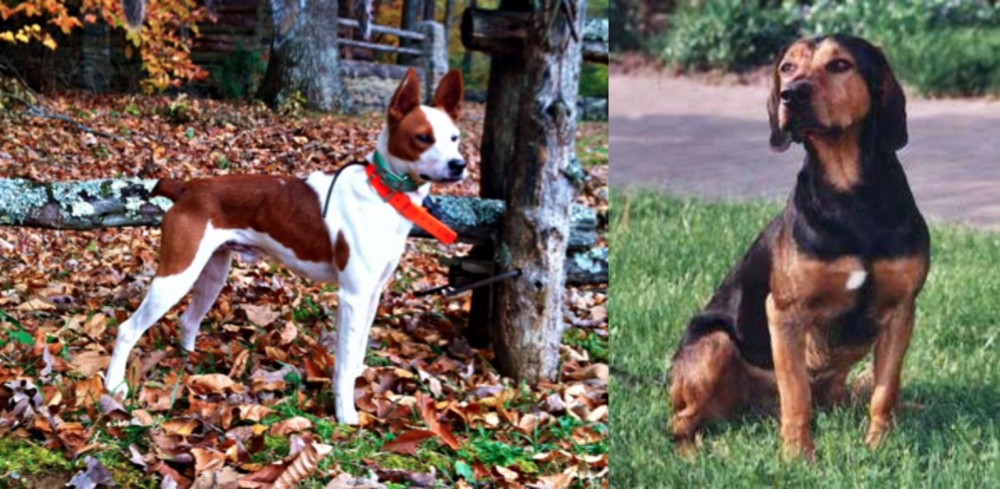 Mountain Feist is originated from United States but Tyrolean Hound is originated from Austria. Mountain Feist may grow 6 cm / 3 inches higher than Tyrolean Hound. Mountain Feist may weigh 27 kg / 60 pounds more than Tyrolean Hound. Mountain Feist may live 4 years more than Tyrolean Hound. Both Mountain Feist and Tyrolean Hound has same litter size. Both Mountain Feist and Tyrolean Hound requires Low Maintenance.
Mountain Feist is originated from United States but Tyrolean Hound is originated from Austria. Mountain Feist may grow 6 cm / 3 inches higher than Tyrolean Hound. Mountain Feist may weigh 27 kg / 60 pounds more than Tyrolean Hound. Mountain Feist may live 4 years more than Tyrolean Hound. Both Mountain Feist and Tyrolean Hound has same litter size. Both Mountain Feist and Tyrolean Hound requires Low Maintenance.
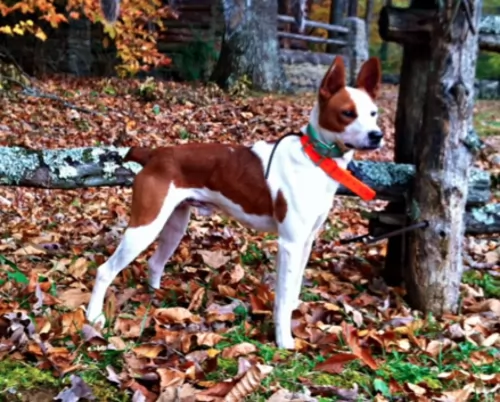 In the Southern portion of North America, the Mountain Feist was developed. It is the Ozarks and Southern Appalachia that the Mountain Fiest calls his ancestral home. The breed dates back centuries and looks very much like a Jack Russell or rat terrier. George Washington, Abraham Lincoln and William Faulkner all featured the breed in their writings. For Washington it was his diary, Lincoln the poem “The Bear Hunt” and Faulkner “Go Down Moses”. These dogs, much like the Curs, were an important part of the early pioneer days in America.
In the Southern portion of North America, the Mountain Feist was developed. It is the Ozarks and Southern Appalachia that the Mountain Fiest calls his ancestral home. The breed dates back centuries and looks very much like a Jack Russell or rat terrier. George Washington, Abraham Lincoln and William Faulkner all featured the breed in their writings. For Washington it was his diary, Lincoln the poem “The Bear Hunt” and Faulkner “Go Down Moses”. These dogs, much like the Curs, were an important part of the early pioneer days in America.
The name Feist means a noisy, small dog in ancient languages. The Feist was developed in the South, the rural areas, in order to hunt and eliminate vermin and small prey animals. The breed was originally a cross between British terriers and hounds from Native Americans. Many others think the feist is not a breed but a type, a working dog which can vary individual to individual.
The Mountain Feist of today has been bred for hunting performance over generations of time. They hunt racoons, squirrel and rabbits among others. They can track even larger game. Other varieties of the feist include the Bench Legged Feist and the Pencil-tail Feist. This is an energetic working dog, curious, intelligent and alert. It is a loud, barky dog that needs to learn a “no bark” command or it may drive you crazy. The breed make good hunting dogs, watch dogs and companions.
The breed was recognized by the United Kennel Club (UKC) in 2015, but not by the AKC or American Kennel Club. Other breed organizations include the National Cur & Feist Breeder’s Association, The National Feist Breeder’s Association, The American Treeing Feist Association, and the Shadowtails Outdoors Group.
 The Tyrolean Hound, also known as Tyroker Bracke or Tiroler Bracke originates from Tyrol, Austria. It seems the dog was developed in the late 1800s for hunting.
The Tyrolean Hound, also known as Tyroker Bracke or Tiroler Bracke originates from Tyrol, Austria. It seems the dog was developed in the late 1800s for hunting.
This is a scenthound that is thought to have descended from Celtic Hounds, Foxhounds and Bloodhounds in the late 1800s.
The dog is a member of the FCI’s scent hound group. The dog was recognized as its own breed in 1908, and in 2006 it was recognized by the United Kennel Club.
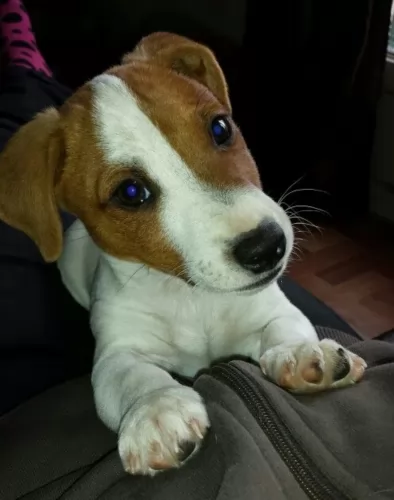 The Mountain Feist is a medium sized dog with pointy ears that are long and fold over. With their sharp nails that are curved they can climb. Their hind legs are strong to support that activity as well. They have small, dark eyes, a black nose and a muzzle that is medium length and a round skull. The neck is strong, and they have a pretty deep chest. The Mountain Feist tail is bushy, high and erect. There coats come in a variety of colors including blue, black, white, red and brown with the brown being the most common.
The Mountain Feist is a medium sized dog with pointy ears that are long and fold over. With their sharp nails that are curved they can climb. Their hind legs are strong to support that activity as well. They have small, dark eyes, a black nose and a muzzle that is medium length and a round skull. The neck is strong, and they have a pretty deep chest. The Mountain Feist tail is bushy, high and erect. There coats come in a variety of colors including blue, black, white, red and brown with the brown being the most common.
There is a lot of variation of make up and type within the breed itself. Until the last decade or so the breed was fairly isolated among squirrel hunters and there was little cross breeding with other dogs. On the other hand, dogs in the regions where the Mountain Feist was isolated were crossed with them to give them the tree climbing ability, change their size, sharpen their senses or one particular sense and change their appearance.
This is why in different regions you will find Mountain Feist with attributes of the Curs, or the Elkhounds, the Terriers, Spitz or Coonhounds. This accounts for the various types of Mountain Feist Dogs.
 The Tyrolean Hound is a medium-sized to large dog. He stands at roughly between 43 to 50cm in height and can weigh between 20 and 27kg.
The Tyrolean Hound is a medium-sized to large dog. He stands at roughly between 43 to 50cm in height and can weigh between 20 and 27kg.
He is muscular, lean and compact. The double coat is short and smooth and can be red, tan, black or tri-colored. The ears are high set, are broad, floppy and long. The tail is long and is carried high.
Independent and intelligent the Tyrolean Hound is a hardworking dog, loving to be active. He has all the characteristics of a great pet and companion – loving, lively, intelligent, independent, easily trained and protective.
He’s the kind of dog that would suit a home with a large garden as opposed to living in the city. He is wary of strangers and has a loud bark to warn you of intruders. He has a friendly nature with his human family and makes a good playmate for children.
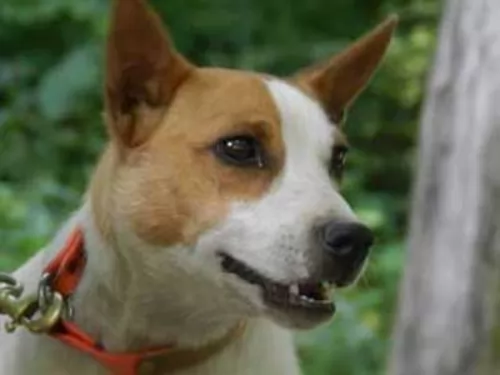 Yes, they very much enjoy playing with children.
Yes, they very much enjoy playing with children.
Tree climbing and stamina.
They need space and land on which to run every day. If you are in an apartment, make sure you have access to a dog park.
They are very intelligent and learn quickly. They love to please but can also be stubborn.
 The Tyrolean Hound is a keen hunting dog loving to be outdoors and active, requiring large grounds to be happy.
The Tyrolean Hound is a keen hunting dog loving to be outdoors and active, requiring large grounds to be happy.
Once he comes indoors he is able to settle down with his human family and have some quiet time with them.
He is loyal and loving, but you are going to have to be prepared for an active lifestyle with this skilled hunting dog of yours.
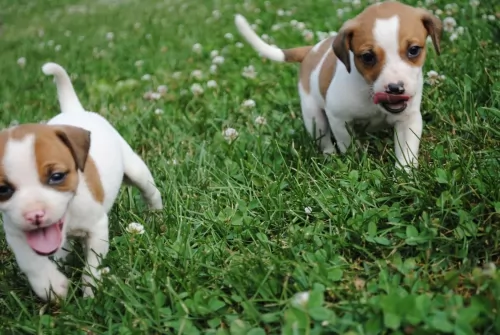 Like most breeds that are isolated, the Mountain Feist does not have a lot of known genetic health issues. They are generally healthy and known to live as many as eighteen years. Perhaps the biggest threat to their lives is the hunting accident, harming joints or paws in hunting situations or being attacked by a larger animal. There are no real genetic threat. Of course, with any dog that has folded ears there is always the possibility of infection or allergies. Keep their ears clean. The other possible concern is hip dysplasia in such an active dog. This can lead to lameness or arthritis. Obesity is another concern that could also lead to hip dysplasia.
Like most breeds that are isolated, the Mountain Feist does not have a lot of known genetic health issues. They are generally healthy and known to live as many as eighteen years. Perhaps the biggest threat to their lives is the hunting accident, harming joints or paws in hunting situations or being attacked by a larger animal. There are no real genetic threat. Of course, with any dog that has folded ears there is always the possibility of infection or allergies. Keep their ears clean. The other possible concern is hip dysplasia in such an active dog. This can lead to lameness or arthritis. Obesity is another concern that could also lead to hip dysplasia.
 Because these dogs put everything into their hunting, injuries related to hunting can sometimes plague this energetic dog.
Because these dogs put everything into their hunting, injuries related to hunting can sometimes plague this energetic dog.
Apart from that, he is robust and can live to be 12 – 14 years of age. There are one or two common dog illnesses to look out for with this dog such as hip dysplasia or ear infections.
The large, floppy ears of the Tyrolean Hound are prone to ear infections. Unlike with dogs that have erect ears, these dogs don’t have their inner ears aired and the dampness, wax and dirt cause bacteria to build up which ultimately leads to an ear infection.
The hip joint forms abnormally, leading to chronic wear and tear together with inflammation. Sometimes the dog will squeal when he gets touched around his hips. The condition can worsen and sometimes the dog even becomes lame. He will need to get to the vet for something to control pain.
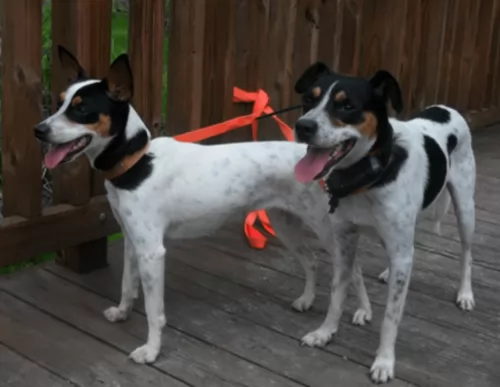 These are very active pups who need a high protein, high quality dry food. Feed a cup to a cup and half broken down into three meals daily. Do not overfeed your puppy.
These are very active pups who need a high protein, high quality dry food. Feed a cup to a cup and half broken down into three meals daily. Do not overfeed your puppy.
Feed the adult about two cups a day broken into two meals. Again, you are looking for a high quality, high protein dry food. Do not overfeed and watch for obesity.
This is a very active breed – a hunting dog with a lot of stamina, strength and energy. They need plenty of exercise as the terrier side of them is just a little hyper. They need at least two walks per day, and they are not great apartment dogs. They need both mental and physical stimulation. This little dog can keep going at a good rate for a long time.
 He has a short coat and will simply require a brush twice a week. Because of the fairly large, floppy ears, he will need to have the inside of his ears checked for redness and the possibility of an ear infection.
He has a short coat and will simply require a brush twice a week. Because of the fairly large, floppy ears, he will need to have the inside of his ears checked for redness and the possibility of an ear infection.
This dog has always been used to plenty of exercise. He won’t adapt to life in the city on a tiny property. The ideal place for this dog is on a large property, preferably a farm.
Walks, hikes, swimming, ball games, hide and seek – he is a dog that can’t seem to get enough action – he wants to be in on all the action. He is intelligent and will also need mental stimulation.
If you were to buy your lean Tyrolean Hound some commercially manufactured food, you’d buy him food that was made for high energy dogs. You’d certainly want to make sure the food is of a high quality, packed with vitamins and minerals and natural ingredients.
He would also love some home-made food too. Raw meat occasionally would do him the world of good. This sort of food needs to be plain and simple such as boiled chicken, brown rice and vegetables.